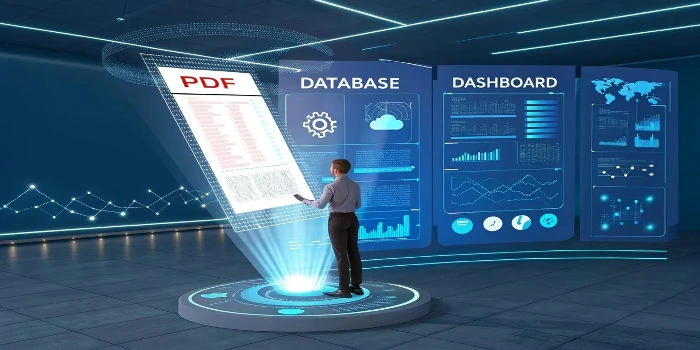20-22 Wenlock Road, LONDON, N1 7GU
20-22 Wenlock Road, LONDON, N1 7GU

In today’s digital age, data extraction is essential for businesses and professionals seeking valuable information from various document formats. PDFs, widely used for secure document sharing, can be challenging to extract content from due to their restrictive nature.
In this blog, we’ll explore how to efficiently extract data from PDFs using a PDF data extractor and other methods. By the end, you’ll understand how to extract content for analysis, reporting, and automation.
PDFs are commonly used in industries such as finance, healthcare, law, and education. Many critical documents, such as contracts, invoices, reports, and research papers, are shared in PDF format.
However, the challenge arises when businesses need to work with this data. PDFs may contain tables, charts, images, and text that need to be extracted for further analysis or integration into other systems. Manually copying and pasting data from PDFs is time-consuming and prone to errors. This is where PDF data extractor tools come in handy.
There are several methods you can use to extract data from PDF documents. Depending on the complexity of the PDF, the following methods can help you efficiently extract content from PDF files.
One of the easiest ways to extract content from PDFs is by using online tools or specialized software. Caelum AI is a leading platform that provides advanced data extraction and conversion features, making it ideal for financial documents like bank statements, receipts, and invoices.
It converts PDF data into usable formats like Excel, CSV, JSON, and XML, simplifying data processing for businesses.
For developers, Python offers libraries to extract content from PDFs programmatically, making it ideal for handling large batches or automating the process.
Popular Python libraries include:
Sometimes, the content you need to extract from PDFs may be embedded as images, such as scanned documents or image-based PDFs. In these cases, Optical Character Recognition (OCR) technology can be used to scan the images and convert the text into machine-readable data.
OCR analyzes the visual elements of the document, recognizes the text, and extracts it for further processing. This method is especially useful when dealing with non-text-based PDFs.
OCR is effective for image-based PDFs, but its accuracy depends on the document quality, image resolution, and text clarity.
For simple PDFs or when you need to extract only a small portion of data, the manual copy-paste method can still be effective. This method works best for PDFs that are not image-based and contain well-structured text.
However, this approach is tedious and prone to errors when working with large volumes of data. It’s also time-consuming and can cause formatting issues in the extracted data.
If you need to automate PDF data extraction, Caelum AI provides a powerful API that integrates seamlessly into your workflows. This API allows you to extract data from PDFs in bulk, handling large volumes of documents with ease.
By automating the process, you can save time, reduce manual errors, and improve efficiency. With Caelum AI, businesses can streamline their operations, ensuring smooth and accurate data extraction, making it the ideal solution for boosting productivity and minimizing effort.
To ensure accurate and efficient data extraction, here are some best practices:
Extracting data from PDF files doesn’t have to be a complicated process. Whether you choose to use online tools, Python libraries, OCR, or automation APIs, there are many ways to efficiently extract content from PDF files. With the right tools and methods, you can save time, reduce errors, and gain valuable insights from your PDF documents.
By understanding how to extract data from PDF efficiently, you can enhance your productivity and ensure that important information is never locked away in an uneditable format. Start using a PDF data extractor today and take advantage of the valuable data hidden within your PDFs!
Using online tools or software like Caelum AI is the easiest way to convert PDF data into formats like Excel, CSV, or JSON for quick processing.
Yes, OCR (Optical Character Recognition) can convert text from scanned or image-based PDFs into machine-readable data, though accuracy depends on document quality.
Developers can use Python libraries like PyPDF2, PDFMiner, or Tabula-py to automate extraction, or use tools like the Caelum AI API for bulk processing.
Check the PDF quality and use reliable extraction tools. Test the process on a small sample before full automation to ensure accuracy.
Yes, you can copy and paste data from simple PDFs, but this method is time-consuming and prone to errors, especially for large volumes of data.